An Analysis of Morality and Utilitarianism: Philosophical Perspectives
VerifiedAdded on 2022/11/26
|6
|1500
|61
Essay
AI Summary
This essay examines the concepts of morality and utilitarianism, exploring the complexities of ethical decision-making. It begins by discussing the subjective nature of morality, contrasting it with the idea of objective truth. The essay then delves into Mill's Principle of Utility, highlighting how behaviors are deemed right or wrong based on their promotion of happiness and pleasure. It explores the core tenets of utilitarianism, including the maximization of utility, the inherent worth of pleasure, and the equal consideration of everyone's happiness. The essay addresses criticisms of utilitarianism, such as the potential for violating individual rights, and presents Mill's responses. It concludes by summarizing the key features of morality and utilitarianism, emphasizing the importance of judging actions based on their outcomes and the impact on overall well-being. The essay also touches upon rule utilitarianism and its focus on the societal impact of moral perspectives.
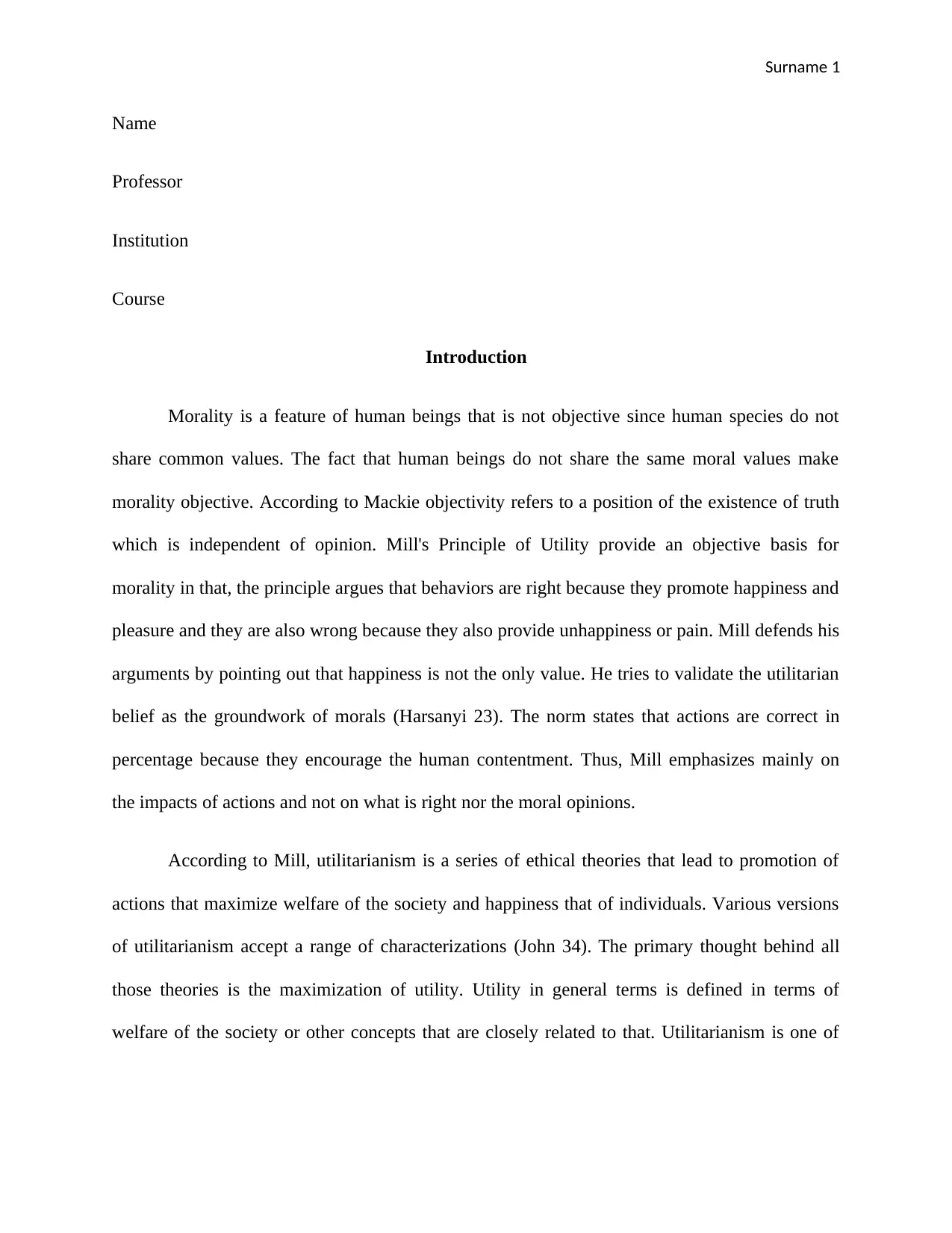
Surname 1
Name
Professor
Institution
Course
Introduction
Morality is a feature of human beings that is not objective since human species do not
share common values. The fact that human beings do not share the same moral values make
morality objective. According to Mackie objectivity refers to a position of the existence of truth
which is independent of opinion. Mill's Principle of Utility provide an objective basis for
morality in that, the principle argues that behaviors are right because they promote happiness and
pleasure and they are also wrong because they also provide unhappiness or pain. Mill defends his
arguments by pointing out that happiness is not the only value. He tries to validate the utilitarian
belief as the groundwork of morals (Harsanyi 23). The norm states that actions are correct in
percentage because they encourage the human contentment. Thus, Mill emphasizes mainly on
the impacts of actions and not on what is right nor the moral opinions.
According to Mill, utilitarianism is a series of ethical theories that lead to promotion of
actions that maximize welfare of the society and happiness that of individuals. Various versions
of utilitarianism accept a range of characterizations (John 34). The primary thought behind all
those theories is the maximization of utility. Utility in general terms is defined in terms of
welfare of the society or other concepts that are closely related to that. Utilitarianism is one of
Name
Professor
Institution
Course
Introduction
Morality is a feature of human beings that is not objective since human species do not
share common values. The fact that human beings do not share the same moral values make
morality objective. According to Mackie objectivity refers to a position of the existence of truth
which is independent of opinion. Mill's Principle of Utility provide an objective basis for
morality in that, the principle argues that behaviors are right because they promote happiness and
pleasure and they are also wrong because they also provide unhappiness or pain. Mill defends his
arguments by pointing out that happiness is not the only value. He tries to validate the utilitarian
belief as the groundwork of morals (Harsanyi 23). The norm states that actions are correct in
percentage because they encourage the human contentment. Thus, Mill emphasizes mainly on
the impacts of actions and not on what is right nor the moral opinions.
According to Mill, utilitarianism is a series of ethical theories that lead to promotion of
actions that maximize welfare of the society and happiness that of individuals. Various versions
of utilitarianism accept a range of characterizations (John 34). The primary thought behind all
those theories is the maximization of utility. Utility in general terms is defined in terms of
welfare of the society or other concepts that are closely related to that. Utilitarianism is one of
Paraphrase This Document
Need a fresh take? Get an instant paraphrase of this document with our AI Paraphraser
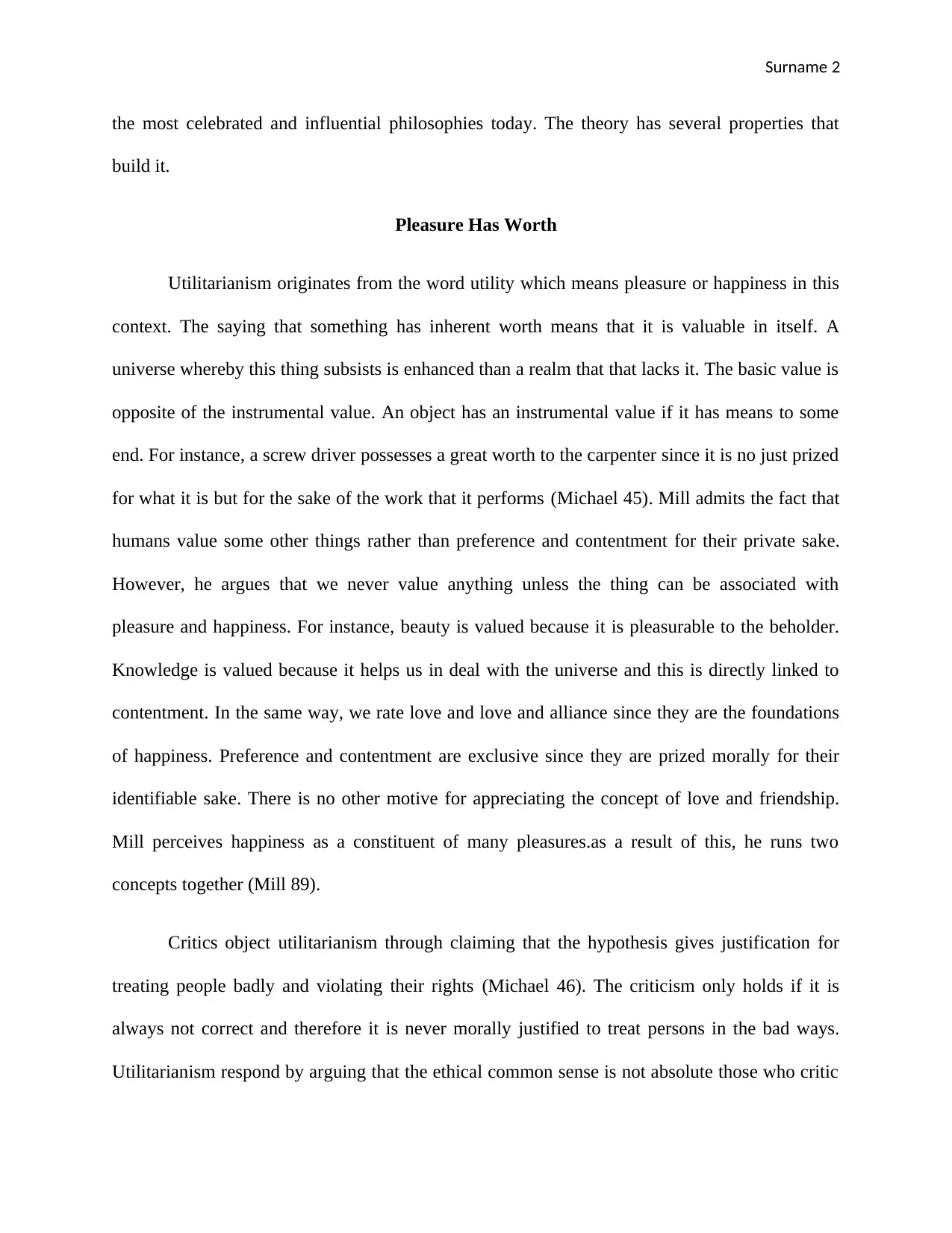
Surname 2
the most celebrated and influential philosophies today. The theory has several properties that
build it.
Pleasure Has Worth
Utilitarianism originates from the word utility which means pleasure or happiness in this
context. The saying that something has inherent worth means that it is valuable in itself. A
universe whereby this thing subsists is enhanced than a realm that that lacks it. The basic value is
opposite of the instrumental value. An object has an instrumental value if it has means to some
end. For instance, a screw driver possesses a great worth to the carpenter since it is no just prized
for what it is but for the sake of the work that it performs (Michael 45). Mill admits the fact that
humans value some other things rather than preference and contentment for their private sake.
However, he argues that we never value anything unless the thing can be associated with
pleasure and happiness. For instance, beauty is valued because it is pleasurable to the beholder.
Knowledge is valued because it helps us in deal with the universe and this is directly linked to
contentment. In the same way, we rate love and love and alliance since they are the foundations
of happiness. Preference and contentment are exclusive since they are prized morally for their
identifiable sake. There is no other motive for appreciating the concept of love and friendship.
Mill perceives happiness as a constituent of many pleasures.as a result of this, he runs two
concepts together (Mill 89).
Critics object utilitarianism through claiming that the hypothesis gives justification for
treating people badly and violating their rights (Michael 46). The criticism only holds if it is
always not correct and therefore it is never morally justified to treat persons in the bad ways.
Utilitarianism respond by arguing that the ethical common sense is not absolute those who critic
the most celebrated and influential philosophies today. The theory has several properties that
build it.
Pleasure Has Worth
Utilitarianism originates from the word utility which means pleasure or happiness in this
context. The saying that something has inherent worth means that it is valuable in itself. A
universe whereby this thing subsists is enhanced than a realm that that lacks it. The basic value is
opposite of the instrumental value. An object has an instrumental value if it has means to some
end. For instance, a screw driver possesses a great worth to the carpenter since it is no just prized
for what it is but for the sake of the work that it performs (Michael 45). Mill admits the fact that
humans value some other things rather than preference and contentment for their private sake.
However, he argues that we never value anything unless the thing can be associated with
pleasure and happiness. For instance, beauty is valued because it is pleasurable to the beholder.
Knowledge is valued because it helps us in deal with the universe and this is directly linked to
contentment. In the same way, we rate love and love and alliance since they are the foundations
of happiness. Preference and contentment are exclusive since they are prized morally for their
identifiable sake. There is no other motive for appreciating the concept of love and friendship.
Mill perceives happiness as a constituent of many pleasures.as a result of this, he runs two
concepts together (Mill 89).
Critics object utilitarianism through claiming that the hypothesis gives justification for
treating people badly and violating their rights (Michael 46). The criticism only holds if it is
always not correct and therefore it is never morally justified to treat persons in the bad ways.
Utilitarianism respond by arguing that the ethical common sense is not absolute those who critic
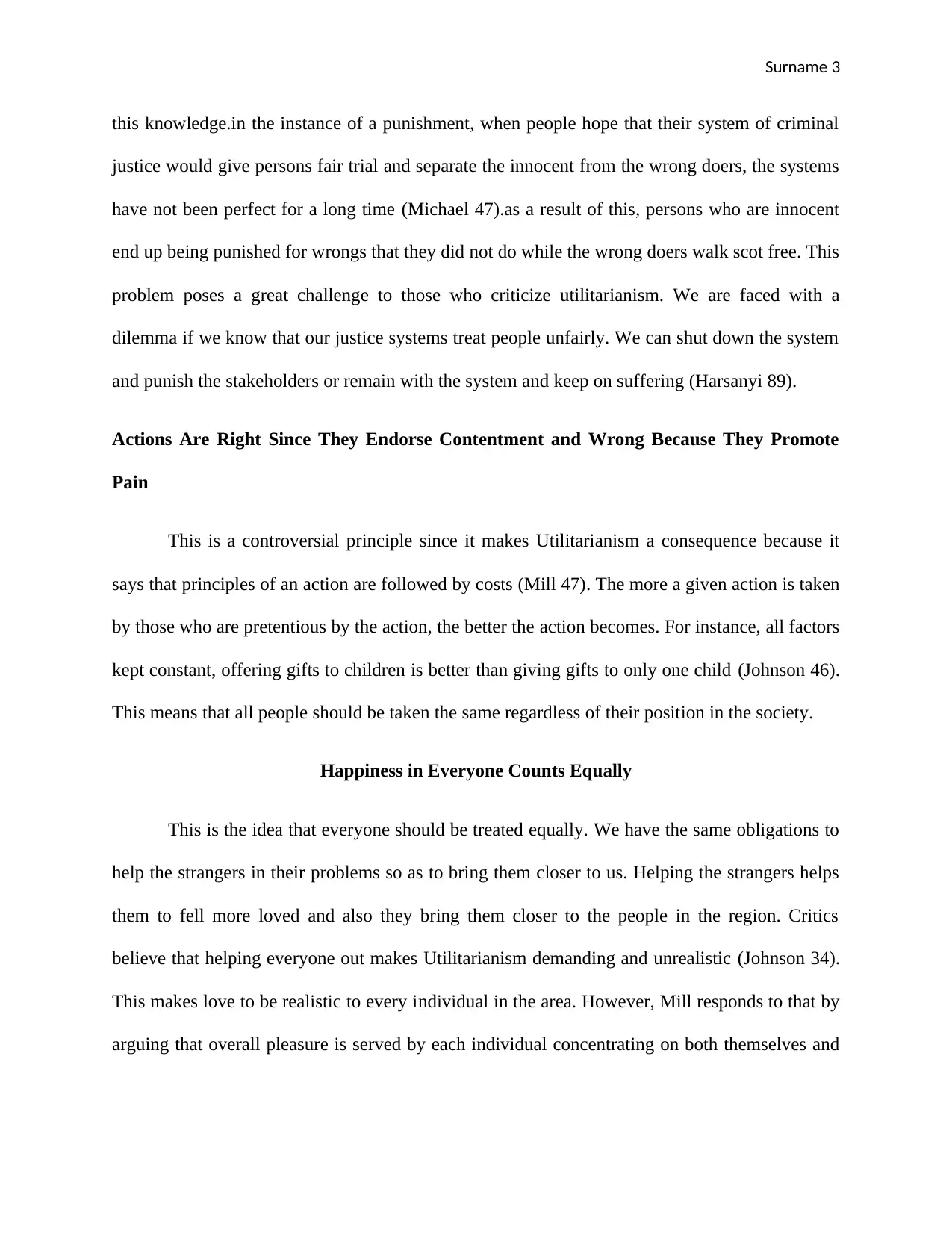
Surname 3
this knowledge.in the instance of a punishment, when people hope that their system of criminal
justice would give persons fair trial and separate the innocent from the wrong doers, the systems
have not been perfect for a long time (Michael 47).as a result of this, persons who are innocent
end up being punished for wrongs that they did not do while the wrong doers walk scot free. This
problem poses a great challenge to those who criticize utilitarianism. We are faced with a
dilemma if we know that our justice systems treat people unfairly. We can shut down the system
and punish the stakeholders or remain with the system and keep on suffering (Harsanyi 89).
Actions Are Right Since They Endorse Contentment and Wrong Because They Promote
Pain
This is a controversial principle since it makes Utilitarianism a consequence because it
says that principles of an action are followed by costs (Mill 47). The more a given action is taken
by those who are pretentious by the action, the better the action becomes. For instance, all factors
kept constant, offering gifts to children is better than giving gifts to only one child (Johnson 46).
This means that all people should be taken the same regardless of their position in the society.
Happiness in Everyone Counts Equally
This is the idea that everyone should be treated equally. We have the same obligations to
help the strangers in their problems so as to bring them closer to us. Helping the strangers helps
them to fell more loved and also they bring them closer to the people in the region. Critics
believe that helping everyone out makes Utilitarianism demanding and unrealistic (Johnson 34).
This makes love to be realistic to every individual in the area. However, Mill responds to that by
arguing that overall pleasure is served by each individual concentrating on both themselves and
this knowledge.in the instance of a punishment, when people hope that their system of criminal
justice would give persons fair trial and separate the innocent from the wrong doers, the systems
have not been perfect for a long time (Michael 47).as a result of this, persons who are innocent
end up being punished for wrongs that they did not do while the wrong doers walk scot free. This
problem poses a great challenge to those who criticize utilitarianism. We are faced with a
dilemma if we know that our justice systems treat people unfairly. We can shut down the system
and punish the stakeholders or remain with the system and keep on suffering (Harsanyi 89).
Actions Are Right Since They Endorse Contentment and Wrong Because They Promote
Pain
This is a controversial principle since it makes Utilitarianism a consequence because it
says that principles of an action are followed by costs (Mill 47). The more a given action is taken
by those who are pretentious by the action, the better the action becomes. For instance, all factors
kept constant, offering gifts to children is better than giving gifts to only one child (Johnson 46).
This means that all people should be taken the same regardless of their position in the society.
Happiness in Everyone Counts Equally
This is the idea that everyone should be treated equally. We have the same obligations to
help the strangers in their problems so as to bring them closer to us. Helping the strangers helps
them to fell more loved and also they bring them closer to the people in the region. Critics
believe that helping everyone out makes Utilitarianism demanding and unrealistic (Johnson 34).
This makes love to be realistic to every individual in the area. However, Mill responds to that by
arguing that overall pleasure is served by each individual concentrating on both themselves and
⊘ This is a preview!⊘
Do you want full access?
Subscribe today to unlock all pages.

Trusted by 1+ million students worldwide
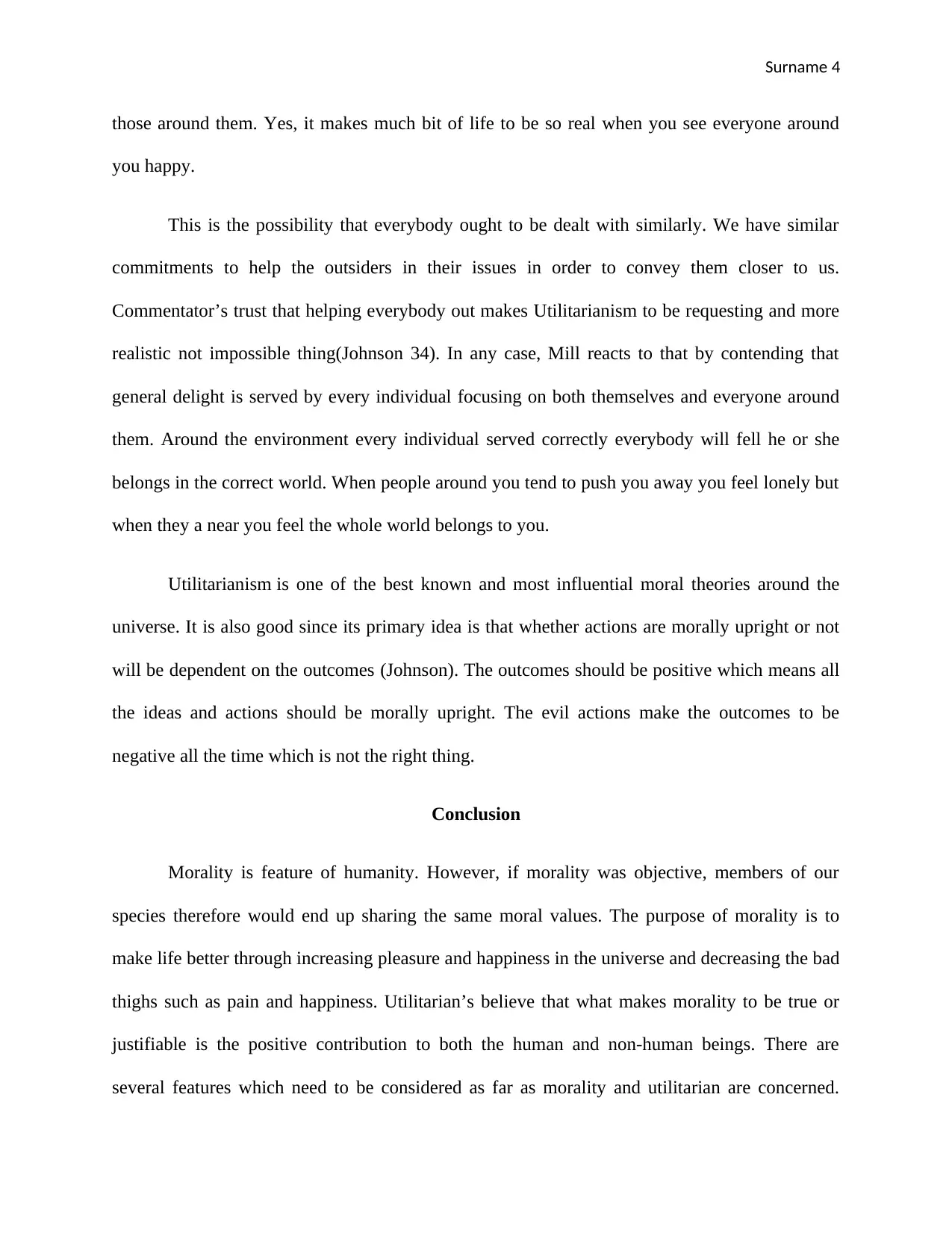
Surname 4
those around them. Yes, it makes much bit of life to be so real when you see everyone around
you happy.
This is the possibility that everybody ought to be dealt with similarly. We have similar
commitments to help the outsiders in their issues in order to convey them closer to us.
Commentator’s trust that helping everybody out makes Utilitarianism to be requesting and more
realistic not impossible thing(Johnson 34). In any case, Mill reacts to that by contending that
general delight is served by every individual focusing on both themselves and everyone around
them. Around the environment every individual served correctly everybody will fell he or she
belongs in the correct world. When people around you tend to push you away you feel lonely but
when they a near you feel the whole world belongs to you.
Utilitarianism is one of the best known and most influential moral theories around the
universe. It is also good since its primary idea is that whether actions are morally upright or not
will be dependent on the outcomes (Johnson). The outcomes should be positive which means all
the ideas and actions should be morally upright. The evil actions make the outcomes to be
negative all the time which is not the right thing.
Conclusion
Morality is feature of humanity. However, if morality was objective, members of our
species therefore would end up sharing the same moral values. The purpose of morality is to
make life better through increasing pleasure and happiness in the universe and decreasing the bad
thighs such as pain and happiness. Utilitarian’s believe that what makes morality to be true or
justifiable is the positive contribution to both the human and non-human beings. There are
several features which need to be considered as far as morality and utilitarian are concerned.
those around them. Yes, it makes much bit of life to be so real when you see everyone around
you happy.
This is the possibility that everybody ought to be dealt with similarly. We have similar
commitments to help the outsiders in their issues in order to convey them closer to us.
Commentator’s trust that helping everybody out makes Utilitarianism to be requesting and more
realistic not impossible thing(Johnson 34). In any case, Mill reacts to that by contending that
general delight is served by every individual focusing on both themselves and everyone around
them. Around the environment every individual served correctly everybody will fell he or she
belongs in the correct world. When people around you tend to push you away you feel lonely but
when they a near you feel the whole world belongs to you.
Utilitarianism is one of the best known and most influential moral theories around the
universe. It is also good since its primary idea is that whether actions are morally upright or not
will be dependent on the outcomes (Johnson). The outcomes should be positive which means all
the ideas and actions should be morally upright. The evil actions make the outcomes to be
negative all the time which is not the right thing.
Conclusion
Morality is feature of humanity. However, if morality was objective, members of our
species therefore would end up sharing the same moral values. The purpose of morality is to
make life better through increasing pleasure and happiness in the universe and decreasing the bad
thighs such as pain and happiness. Utilitarian’s believe that what makes morality to be true or
justifiable is the positive contribution to both the human and non-human beings. There are
several features which need to be considered as far as morality and utilitarian are concerned.
Paraphrase This Document
Need a fresh take? Get an instant paraphrase of this document with our AI Paraphraser
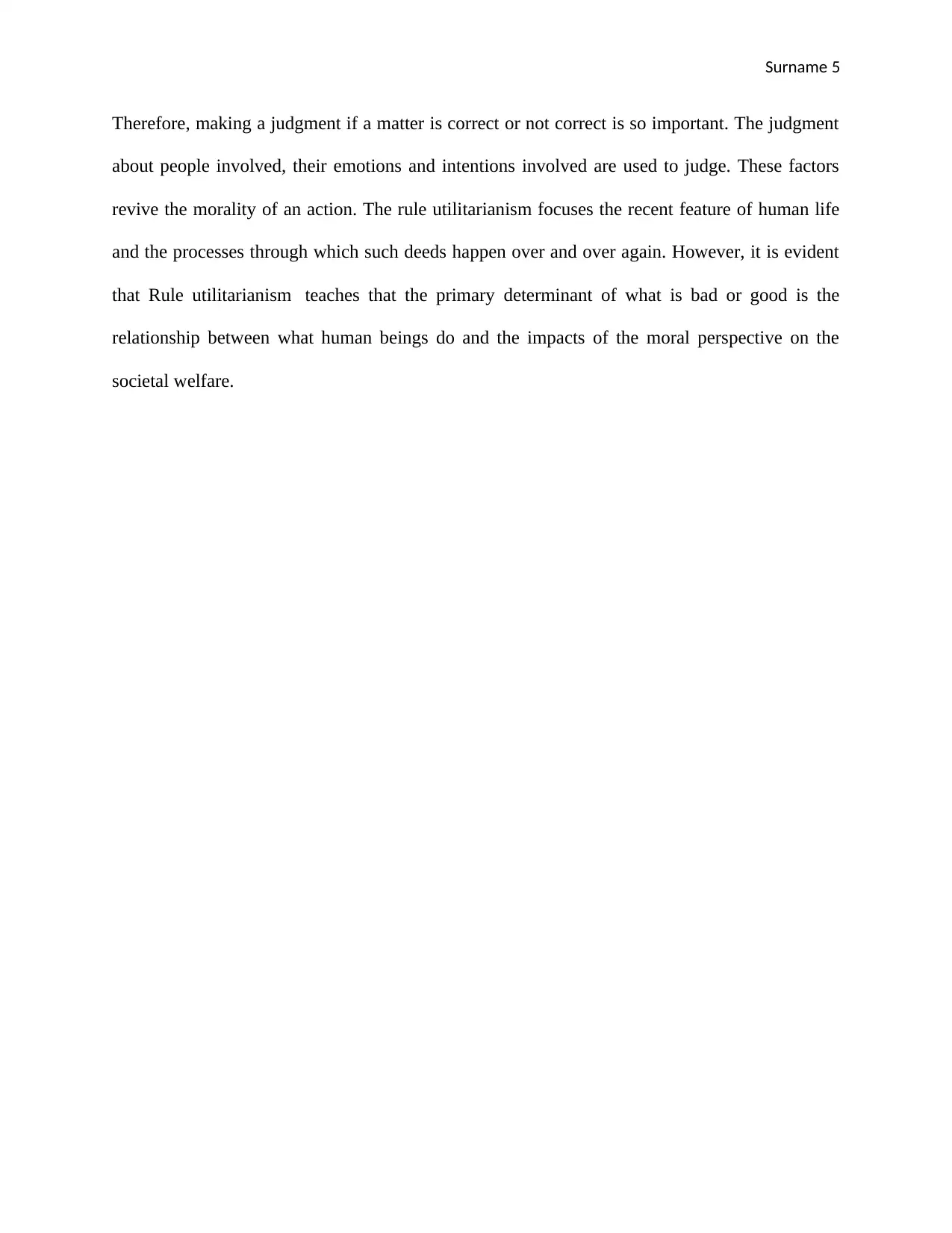
Surname 5
Therefore, making a judgment if a matter is correct or not correct is so important. The judgment
about people involved, their emotions and intentions involved are used to judge. These factors
revive the morality of an action. The rule utilitarianism focuses the recent feature of human life
and the processes through which such deeds happen over and over again. However, it is evident
that Rule utilitarianism teaches that the primary determinant of what is bad or good is the
relationship between what human beings do and the impacts of the moral perspective on the
societal welfare.
Therefore, making a judgment if a matter is correct or not correct is so important. The judgment
about people involved, their emotions and intentions involved are used to judge. These factors
revive the morality of an action. The rule utilitarianism focuses the recent feature of human life
and the processes through which such deeds happen over and over again. However, it is evident
that Rule utilitarianism teaches that the primary determinant of what is bad or good is the
relationship between what human beings do and the impacts of the moral perspective on the
societal welfare.
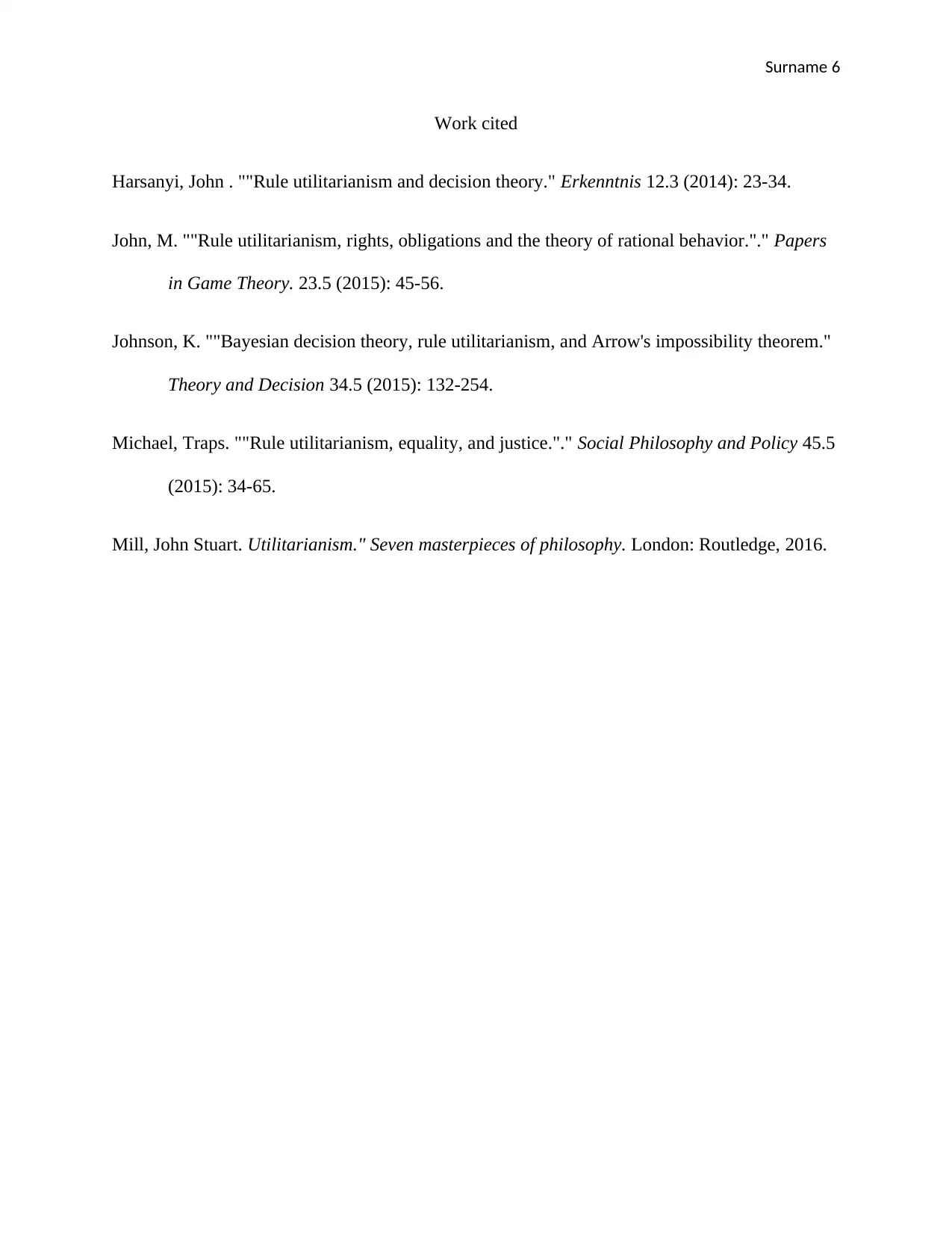
Surname 6
Work cited
Harsanyi, John . ""Rule utilitarianism and decision theory." Erkenntnis 12.3 (2014): 23-34.
John, M. ""Rule utilitarianism, rights, obligations and the theory of rational behavior."." Papers
in Game Theory. 23.5 (2015): 45-56.
Johnson, K. ""Bayesian decision theory, rule utilitarianism, and Arrow's impossibility theorem."
Theory and Decision 34.5 (2015): 132-254.
Michael, Traps. ""Rule utilitarianism, equality, and justice."." Social Philosophy and Policy 45.5
(2015): 34-65.
Mill, John Stuart. Utilitarianism." Seven masterpieces of philosophy. London: Routledge, 2016.
Work cited
Harsanyi, John . ""Rule utilitarianism and decision theory." Erkenntnis 12.3 (2014): 23-34.
John, M. ""Rule utilitarianism, rights, obligations and the theory of rational behavior."." Papers
in Game Theory. 23.5 (2015): 45-56.
Johnson, K. ""Bayesian decision theory, rule utilitarianism, and Arrow's impossibility theorem."
Theory and Decision 34.5 (2015): 132-254.
Michael, Traps. ""Rule utilitarianism, equality, and justice."." Social Philosophy and Policy 45.5
(2015): 34-65.
Mill, John Stuart. Utilitarianism." Seven masterpieces of philosophy. London: Routledge, 2016.
⊘ This is a preview!⊘
Do you want full access?
Subscribe today to unlock all pages.

Trusted by 1+ million students worldwide
1 out of 6
Related Documents
Your All-in-One AI-Powered Toolkit for Academic Success.
+13062052269
info@desklib.com
Available 24*7 on WhatsApp / Email
![[object Object]](/_next/static/media/star-bottom.7253800d.svg)
Unlock your academic potential
Copyright © 2020–2026 A2Z Services. All Rights Reserved. Developed and managed by ZUCOL.





